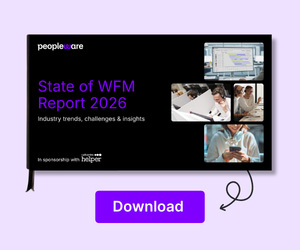Want to be more productive on the job? Learn from the experts who know how to get the oxygen flowing and the blood pumping.
“Sit up straight!”
“Take a deep breath!”
We’ve received those pieces of advice many times during our lives. What we probably didn’t realize is that they can also help us do our jobs better.
That’s because, believe it or not, posture and breathing play a vital role in making us more productive at work, especially when work involves talking on the phone.
In a recent study of the most-productive call- or contact center agents, we determined that one of the traits they shared, in addition to staying hydrated, which we discussed previously, was that they were 24% more likely to shift their posture throughout the day than their less-productive counterparts.
What is it about this motion that makes for better phone conversations? After all, conventional wisdom suggests that by hiding behind the partial anonymity of a phone, we can slouch all we want and the person on the other end will never be the wiser.
But conventional wisdom has it wrong.
It’s long been known that sitting stationary for long periods of time is bad for our health. Our circulatory system continually sends vital blood, oxygen and nutrients throughout the body. By maintaining the same position for long stretches, especially when combined with poor posture, the blood vessels responsible for feeding our brain and muscles become compressed, blood flow is reduced and fatigue sets in. That, in turn, makes us more tired and less productive.
In fact, just as savvy airline travelers know to move around often to avoid potentially deadly blood clots from long periods of immobility, we need to do the same in our work environments. By sitting up straight, especially on an ergonomic chair, changing our seating position often and taking frequent breaks to stretch our legs, we’ll keep our brain and muscles fresh and invigorated and our productivity energized.
Take a Deep Breath
Breathing has a similar effect on productivity, especially during phone conversations. Most of us are shallow breathers; we take rapid, short breaths in and out. The trouble is, shallow breaths make us sound tired while on the phone. Successful phone professionals know to take a deep breath before beginning a phone conversation and to quietly continue to do so throughout the call.
Those deep breaths enable them to project energy in their voices and provide a sense of confidence to the caller. In a way, it’s quite similar to what an opera star does while performing. By filling their lungs fully, they’re able to project plenty of power and achieve clear, rich notes.
Try it yourself! When picking up or making a call, take a deep breath and begin speaking while slowly exhaling that breath. You’ll be amazed at how much energy your voice contains.
So for better results at work, mind your posture and breathe deeply when on the phone. You’ll be surprised at how much more you accomplish!
Author: Guest Author
Published On: 11th Oct 2016 - Last modified: 11th Apr 2017
Read more about - Guest Blogs, Jabra




































